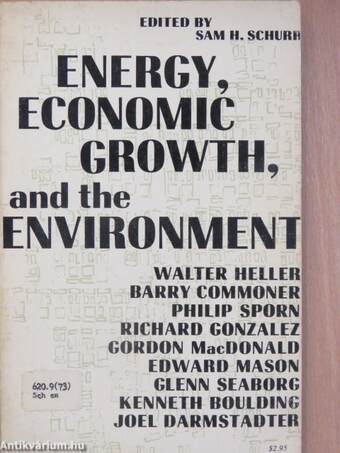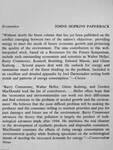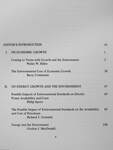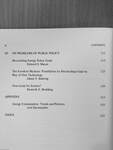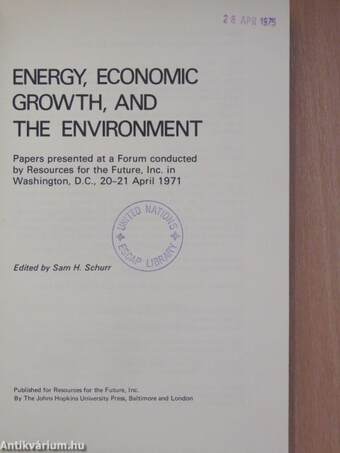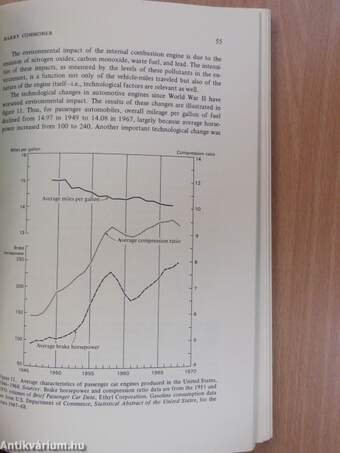1.068.213
kiadvánnyal nyújtjuk Magyarország legnagyobb antikvár könyv-kínálatát

VISSZA
A TETEJÉRE
JAVASLATOKÉszre-
vételek
Energy, Economic Growth, and the Environment
Papers presented at a Forum conducted by Resources for the Future, Inc. in Washington, D. C., 20-21 April 1971
| Kiadó: | The Johns Hopkins University Press |
|---|---|
| Kiadás helye: | Baltimore-London |
| Kiadás éve: | |
| Kötés típusa: | Ragasztott papírkötés |
| Oldalszám: | 232 oldal |
| Sorozatcím: | John Hopkins Paperback |
| Kötetszám: | |
| Nyelv: | Angol |
| Méret: | 23 cm x 15 cm |
| ISBN: | 0-8018-1553-3 |
| Megjegyzés: | Fekete-fehér ábrákkal. További szerzők a kötetben. |
naponta értesítjük a beérkező friss
kiadványokról
naponta értesítjük a beérkező friss
kiadványokról
Fülszöveg
Economics
JOHNS HOPKINS PAPERBACK
"Without doubt the finest volume that has yet been published on the
conflict emerging between two of the nation's objectives: providing
energy to meet the needs of future economic growth and protecting
the quality of the environment. The nine contributors to this well-
integrated work, based on a Resources for the Future Symposium,
include such outstanding economists and scientists as Walter Heller,
Barry Commoner, Kenneth Boulding, Edward Mason, and Glenn
Seaborg. . . . Several papers deal with the outlook for energy and
summarize much of the finest thinking on the problem. Included is
an excellent and detailed appendix by Joel Darmstadter setting forth
trends and patterns of energy consumption."—Choice
"Barry Commoner, Walter Heller, Glenn Seaborg, and Gordon
MacDonald lead the list of contributors. . . . Heller offers hope that
the 'economist and environmentalist can work out their differences
and find solutions to the problem... Tovább
Fülszöveg
Economics
JOHNS HOPKINS PAPERBACK
"Without doubt the finest volume that has yet been published on the
conflict emerging between two of the nation's objectives: providing
energy to meet the needs of future economic growth and protecting
the quality of the environment. The nine contributors to this well-
integrated work, based on a Resources for the Future Symposium,
include such outstanding economists and scientists as Walter Heller,
Barry Commoner, Kenneth Boulding, Edward Mason, and Glenn
Seaborg. . . . Several papers deal with the outlook for energy and
summarize much of the finest thinking on the problem. Included is
an excellent and detailed appendix by Joel Darmstadter setting forth
trends and patterns of energy consumption."—Choice
"Barry Commoner, Walter Heller, Glenn Seaborg, and Gordon
MacDonald lead the list of contributors. . . . Heller offers hope that
the 'economist and environmentalist can work out their differences
and find solutions to the problem of needed growth and the environ-
ment.' He believes that the most difficult problem will be making the
producer and the consumer willing to reorient priorities and pay for
past damages and future use of the environment. Barry Commoner
advances the theory that pollution is largely the product of tech-
nological advances made after 1946. He attributes the real disaster
to the development of synthetic products and disposable containers.
MacDonald examines the effects of rising energy consumption on
environmental quality while Seaborg speculates on the technological
means of meeting the increased demands for energy."—Conservation
News Vissza
Témakörök
- Közgazdaságtan > Gazdaságpolitika
- Idegennyelv > Idegennyelvű könyvek > Angol > Műszaki
- Idegennyelv > Idegennyelvű könyvek > Angol > Természettudományok > Biológia
- Idegennyelv > Idegennyelvű könyvek > Angol > Közgazdaságtan > Gazdaságpolitika
- Műszaki > Ipar > Iparpolitika
- Természettudomány > Biológia > Ökológia, környezetvédelem > Környezetvédelem > Környezetgazdálkodás
- Természettudomány > Biológia > Ökológia, környezetvédelem > Idegennyelvű
- Műszaki > Ipar > Nehézipar > Energiaipar > Egyéb
- Műszaki > Idegennyelv > Angol
- Műszaki > Üzemgazdaság, üzemszervezés > Munka-, tűz- és környezetvédelem
- Műszaki
Megvásárolható példányok
Nincs megvásárolható példány
A könyv összes megrendelhető példánya elfogyott. Ha kívánja, előjegyezheti a könyvet, és amint a könyv egy újabb példánya elérhető lesz, értesítjük.



